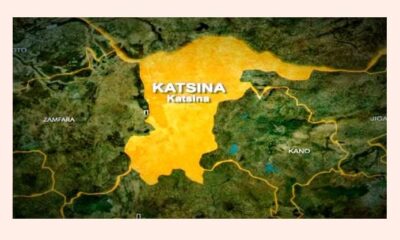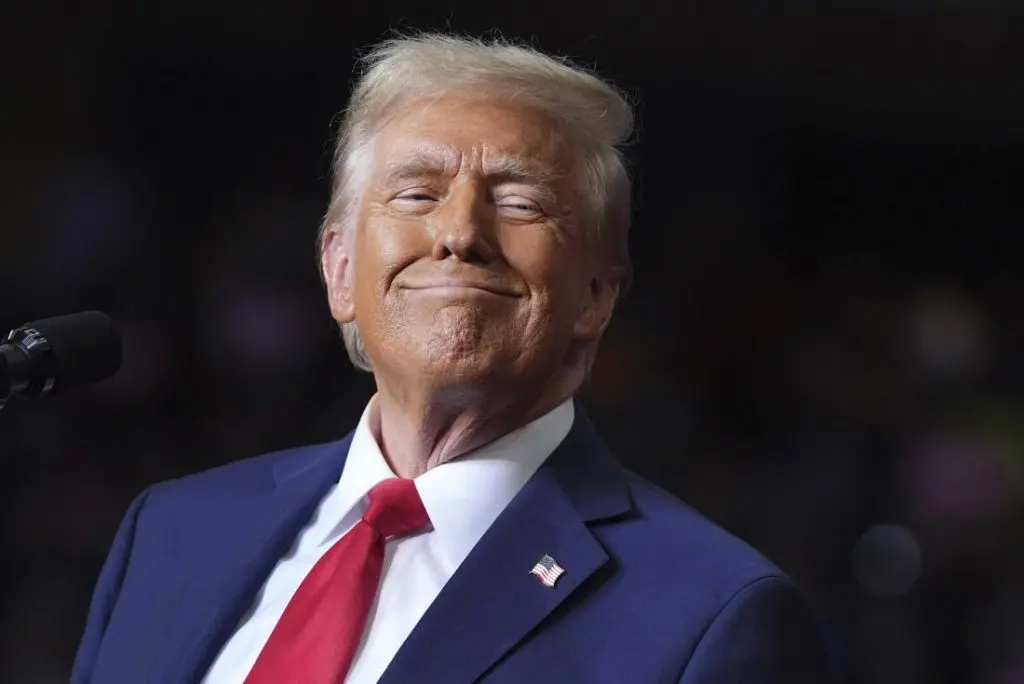Business
NDIC to liquidate 87 microfinance banks revoked by CBN
Published
8 months agoon
By
Ekwutos Blog
The Nigerian Deposit Insurance Corporation (NDIC) will, at the expiration of its notice released on August 23, 2024, approach a Federal High Court to grant the order to dissolve 87 microfinance banks and primary mortgage banks in the country.
The Corporation disclosed this in a statement titled “Notice of intention to terminate liquidation activities” published on its website.
The statement reads, “NOTICE is hereby given to the General Public that the Nigeria Deposit Insurance Corporation (NDIC), in its capacity as the Liquidator of the under-listed closed Microfinance Banks and Primary Mortgage Institutions, in accordance with the provisions of its enabling law and other relevant laws, will at the expiration of thirty (30) days from the date of this publication present an application to the Federal High Court to obtain dissolution orders of the closed banks and to release/discharge Corporation as Liquidator of the banks.”
NDIC stated reasons for its actions to include the fact that the affected banks were either not located or embarked on self-liquidation.
See Affected Banks and their dates of licence revocation
1. Galilee MFB, Abuja – 26 September 2018
2. Pinnacle MFB, Abuja – 4 February 2014
3. Royal Children Heritage MFB, Abuja – 26 September 2018
4. Savings Corp MFB, Abuja – 26 September 2018
5. Spec MFB, Abuja – 26 September 2018
6. Imad MFB, Abuja – 26 September 2018
7. Ihima MFB, Kogi – 4 February 2014
8. Liberty MFB, Kogi – 26 September 2018
9. Ovidi MFB, Kogi – 24 November 2020
10. New Mercantile MFB, Abuja – 4 February 2014
11. Altitude MFB, Lagos – 26 September 2018
12. Bonded MFB, Lagos – 26 September 2018
13. Hybrid MFB, Lagos – 26 September 2018
14. Mar-Bonch MFB, Lagos – 26 September 2018
15. Coral MFB, Lagos – 26 September 2018
16. Lasu MFB, Lagos – 26 September 2018
17. Shoreline MFB, Lagos – 26 September 2018
18. Sovereign MFB, Lagos – 26 September 2018
19. Wealthbasket MFB, Lagos – 26 September 2018
20. EDS MFB, Lagos – 4 February 2014
21. Compass MFB, Lagos – 4 February 2014
22. Enterprise MFB, Lagos – 4 February 2014
23. Freegate MFB, Lagos – 4 February 2014
24. Funds Matrix MFB, Lagos – 4 February 2014
25. Green Field MFB, Lagos – 4 February 2014
26. Interglobal MFB, Lagos – 4 February 2014
27. Kings MFB, Lagos – 4 February 2014
28. Keystone MFB, Lagos – 4 February 2014
29. Vinning MFB, Lagos – 4 February 2014
30. Marvelous MFB, Lagos – 26 September 2018
31. Santrust MFB, Lagos – 26 September 2018
32. TSM MFB, Lagos – 26 September 2018
33. Biztrust MFB, Lagos – 26 September 2018
34. Gideon Trust MFB, Lagos – 26 September 2018
35. Ethics MFB, Lagos – 26 September 2018
36. First Credit MFB, Lagos – 26 September 2018
37. Gapbridge MFB, Lagos – 26 September 2018
38. New Gate MFB, Lagos – 24 September 2010
39. Primate MFB, Lagos – 24 September 2010
40. Mustason MFB, Lagos – 24 September 2010
41. Mustard MFB, Lagos – 26 September 2018
42. Southwest MFB, Lagos – 24 September 2010
43. Trust One MFB, Lagos – 23 May 2023
44. Traders MFB, Lagos – 4 February 2014
45. Citiserve MFB, Lagos – 4 February 2014
46. SVP MFB, Rivers – 4 February 2014
47. CKC MFB, Rivers – 4 February 2014
48. Acorn MFB, Rivers – 4 February 2014
49. Aracom MFB, Ondo – 4 February 2014
50. Homeland MFB, Bayelsa – 24 September 2010
51. First Golden Mercury MFB, Osun – 4 February 2014
52. Cubic MFB, Edo – 24 September 2010
53. Solace MFB, Delta – 4 February 2010
54. Top Mega Trust MFB, Delta – 4 February 2014
55. Advance MFB, Akwa Ibom – 26 September 2018
56. Umu-Uma MFB, Anambra – 4 February 2014
57. First Amalgamated B/S, Kwara – 5 January 2015
58. Horizon Building Society, Abuja – 6 August 2012
59. Imani Savings & Loans, Abuja – 6 August 2012
60. New Capital Savings & Loans, Abuja – 6 August 2012
61. Owners Home S & L, Abuja – 6 August 2012
62. Perennial Building Society, Abuja – 6 August 2012
63. Primrose Savings & Loans, Abuja – 6 August 2012
64. Global Building Society (Confluence S&L), Abuja – 5 January 2015
65. Melrose Savings & Loans, Abuja – 6 August 2012
66. Acclaim Homes and Loans, Lagos – 6 August 2012
67. CB Homes Savings and Loans, Lagos – 6 August 2012
68. Coastal Homes Savings and Loans, Lagos – 6 August 2012
69. Crest Mortgage Savings and Loans, Lagos – 6 August 2012
70. Estaport Building Society, Lagos – 6 August 2012
71. Guardian Trust S & L, Lagos – 6 August 2012
72. Home Trust Savings and Loans, Lagos – 6 August 2012
73. Mars Home Investment Savings and Loans, Lagos – 6 August 2012
74. Omono Building Society, Lagos – 6 August 2012
75. Secure Savings and Loans, Lagos – 6 August 2012
76. Urban Shelter Savings and Loans, Lagos – 6 August 2012
77. Consolidated Estate Building Society, Lagos – 5 January 2015
78. Home Foundation Savings and Loans, Lagos – 5 January 2015
79. Password Savings and Loans, Lagos – 5 January 2015
80. Supreme Savings and Loans, Lagos – 1 October 2018
81. Midland Mortgages, Rivers – 5 January 2015 (Self-liquidation)
82. Garden City MFB, Rivers – 26 September 2018 (Self-liquidation)
83. Combined Benefit MFB, Bayelsa – 4 February 2014 (Self-liquidation)
84. Corporate MFB, Oyo – 4 February 2014 (Self-liquidation)
85. Lofty Heights MFB, Edo – 4 February 2014 (Self-liquidation)
86. Express MFB, Abia – 4 February 2014 (Self-liquidation)
87. Multi-Banc Savings and Loans, Lagos – 5 January 2015 (Self-liquidation)
You may like


Taxing The Dead: Enugu State Government Faces Backlash For Imposing Mortuary Tax On Corpses


PG Otolo Nnewi nullifies Innoson claim of no prior demolition notification to property owners in Nnewi


Katsina: Security forces stop bandits in Doma, recover eight motorcycles


Ohanaeze youths knock FG over closure of Enugu airport, concession plan


Obi Cubana’s Adopted Son Claims He’s Next of Kin – Obi Responds


150 PDP, LP members defect to APC in Enugu, back Utazi’s suspension
Business
Naira depreciates against dollar across official, black markets after Easter holidays
Published
4 hours agoon
April 23, 2025By
Ekwutos Blog
Nigeria’s currency, the naira, depreciated against the dollar at the official and parallel foreign exchange markets upon the resumption of work after Easter holidays.
The Central Bank of Nigeria’s data showed that it weakened to N1,602.63 per dollar on Tuesday from N1,599.93 exchanged on Thursday last week.
This means that it declined by N2.7 against the dollar on a day-to-day basis.
Similarly, the naira fell to N1620 per dollaron Tuesday from N1610 at the weekend.
The N1,620 dollar exchange rate at the black market is the same rate recorded on Thursday before the Easter holidays.
The development comes following the sustained slump in the dollar amid threats to US Federal Reserve independence and the tariff war.
Business
US: Tariffs on China will come down substantially – Trump announces
Published
5 hours agoon
April 23, 2025By
Ekwutos Blog
President Donald Trump of the United States has said that high tariffs on goods from China will come down substantially.
He said the tariffs would crash but won’t go down to 0%.
The President stated this during a White House news conference on Tuesday.
Trump stated this in response to earlier comments same day by treasury secretary, Scott Bessent.
Bessent had made it clear that the high tariffs were unsustainable.
Recall that the US had placed import taxes of 145% on China and in response the Asian giants retaliated with 125% tariffs on US goods.
Trump had announced what he described as a reciprocal tariffs on nations across the globe, causing the stock market to stumble and interest rates to increase on US debt.
“We’re doing fine with China,” Trump said.
Despite his high tariffs, Trump said he would be “very nice” to China and not play hardball with Chinese President Xi Jinping.
He added, “We’re going to live together very happily and ideally work together.”
Trump said that the final tariff rate with China would come down “substantially” from the current 145%, saying “It won’t be that high, not going to be that high.”
Business
Nigeria’s electricity generation records steady drop – Report
Published
1 day agoon
April 22, 2025By
Ekwutos Blog
Nigeria’s electricity generation peak has recorded a steady drop to 4,742.20 megawatts in the past three days.
This is according to the National Grid performance report from Thursday, 17 to 19 April 2025.
The report showed that electricity generation dropped by 531 megawatts in the last three days.
Accordingly, the system performance data indicated that the electricity generation peak stood at 5,273.80 megawatts on Thursday but dropped to 5,131.20 megawatts and 4,742.80 megawatts on Friday and Saturday.
The development comes days after the Minister of Power, Adebayo Adelabu, announced that Nigeria hit its highest energy peak of 5,801.63 MW.
On Thursday, Adelabu reiterated that the government is doing everything to avert a collapse of the country’s power sector and plans to partly offset the N4 trillion owed to the electricity generation companies.

Taxing The Dead: Enugu State Government Faces Backlash For Imposing Mortuary Tax On Corpses

PG Otolo Nnewi nullifies Innoson claim of no prior demolition notification to property owners in Nnewi

Katsina: Security forces stop bandits in Doma, recover eight motorcycles
Trending

 Trending6 months ago
Trending6 months agoNYA demands release of ‘abducted’ Imo chairman, preaches good governance
- Business6 months ago
US court acquits Air Peace boss, slams Mayfield $4000 fine

 Politics6 months ago
Politics6 months agoMexico’s new president causes concern just weeks before the US elections
- Entertainment6 months ago
Bobrisky transferred from Immigration to FCID, spends night behind bars
- Entertainment6 months ago
Bobrisky falls ill in police custody, rushed to hospital

 Politics6 months ago
Politics6 months agoRussia bans imports of agro-products from Kazakhstan after refusal to join BRICS

 Politics6 months ago
Politics6 months agoPutin invites 20 world leaders
- Politics1 year ago
Nigerian Senate passes Bill seeking the establishment of the South East Development Commission.

